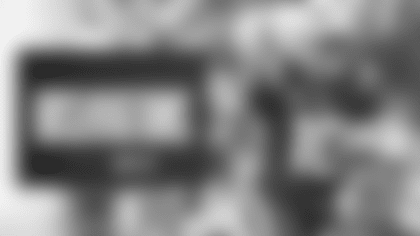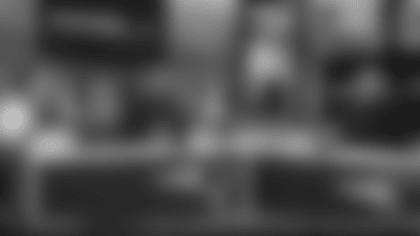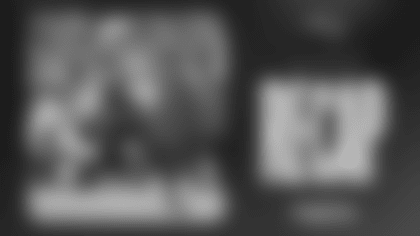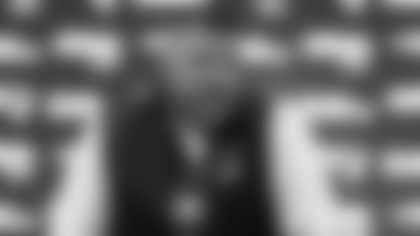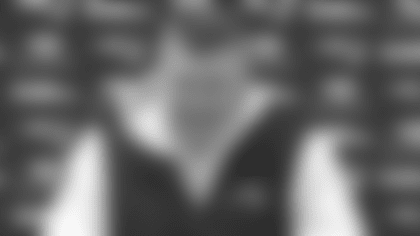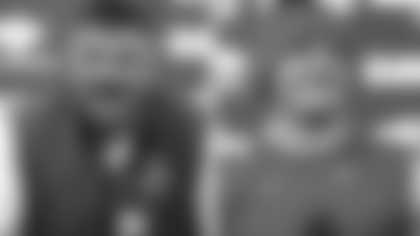[wysifield-embeddedaudio|eid="495906"|type="embeddedaudio"|view_mode="full"]BILL BELICHICK, HEAD COACH
Q: Can you add any clarity to Rob Gronkowski's health situation and whether or not you anticipate him being available this week?
BB: Yeah, no I don't have anything to add. The players aren't in today so we'll put a report out Wednesday after we practice and see what happens on Wednesday.
Q: How would you evaluate Martellus Bennett's performance on Sunday night?
BB: Yeah, he's done a good job for us all year. He's a big target, smart, very experienced in the passing game. I know we have a lot of confidence in him.
Q: There seems to be less no-huddle offense this year than in previous years. What goes into that decision?
BB: Well, when we go through the game plan, set things up for the week, we take everything into consideration. We try to do things that we feel like can gain an advantage. If we feel like we can gain an advantage doing something then we do it, and if we don't then we won't or we'll do something else. The tradeoff between going no-huddle and basically not substituting, leaving the same people on the field versus changing personnel is – it's really hard to do both. So one or the other, then once you try to do everything then you run into an issue of volume. A lot of times there are good things, good ideas that other teams do, but then how much can you do, so all of that plays into it.
Q: Do you ever think that by running less no-huddle like you have this year that it can benefit the defense by slowing the game down and preventing the amount of time they're on the field?
BB: Well, I think offensively you try to score points and defensively you try to play defense, so when we start trying to play offense on defense and defense on offense it's a hard way to play. I mean it's certainly an element of complementary football; I'm not saying that. Things are related but in the end when you have the ball you've got to try and score, and when you don't have the ball you've got to try to stop the other team.
Q: What is the reasoning behind Jacoby Brissett still being around the team and on the sidelines whereas perhaps other players on injured reserve are not able to participate as much?
BB: I'd say it's more to do with the position he plays than the injury.
Q: If that's the case then is it a matter of wanting him to see the game operation and communication that goes into the quarterback positon? Can he contribute to the team in that role or is he more of an observer?
BB: Well, I mean he's only been in four regular season games so I think the experience that he gets from being able to see the things that go on during the game are valuable for him. Might be valuable for some other players, too; I'm not saying that. But the quarterback position in particular I'd say it's a little bit different.
Q: What do you continue to see from James Develin on film and what does he bring to the running game?
BB: James [Develin]'s a very dependable player. He's got a solid role for us on the team and on offense and in the kicking game. He's been very dependable in that. When those situations come up we know we can count on him and he does a good job of coming through for us.
Q: How has Colin Kaepernick adapted under Chip Kelly's offense, and also what kind of a challenge does it present going out west to face a time you aren't very familiar with and haven't played since 2012?
BB: Right. Well, I guess first of all as it relates to the going out there and travel and all of that – I think that's something that we've done quite a bit of. We already had a west coast trip this year earlier. I mean it is what it is. It's not something that we do all of the time but we've already had one this year and we've done it in the past so we'll kind of use our experience in that routine. The stadium we haven't played in, so there will be an acclimation adjustment there for all of us, but certainly an advantage for San Francisco. We're not familiar with that at all. That's something we'll have to consider. And you're right as far as the team goes, there are not a lot of carryover players from when we played them in 2012 here. They have a new coaching staff. We have some familiarity with some of the systems that they employ but not directly with the players that they have now, so that'll be an adjustment for us. Certainly, we didn't do very well last year in the Philadelphia game in both the kicking game and really in any phase of the game. Coach [Chip] Kelly's a great coach. I have a lot of respect for him. I'm sure that he'll do things that will attack us as he did last year against Philadelphia so we'll have to not only do a good job preparing for those schemes but also again with players that we're not really familiar with or as familiar with, with their skill set. It'll take a lot of good preparation and film study. We have, whatever it is, 10 games on them, so there's a lot of information out there. Again, this is a game plan team so just because they have or haven't done something on film doesn't mean that we're going to see it. They'll have things specifically designed for us, so I'm sure they'll be an element of making adjustments during the game and figuring out how this matchup game is going to be played as opposed to just what our scouting report says on the 49ers. Those are all big challenges this week, as you said, traveling, just forcing the whole issue on the preparation so we need a great week of preparation and concentration; really utilize all of our time and meeting and practice opportunities efficiently. There's just a lot we have to get ready for.
Q: Previously teams have had problems with their footing on the turf in San Francisco. How will you approach that aspect?
BB: Well, I think any time we play on the road, I mean, at home we have all our things here, but any time we play on the road, we have to cover all the contingencies anyway. You could be playing in a downpour, especially in that area of the country. It's not like it doesn't rain out there. If you're playing somewhere else, if you're playing in Green Bay or playing in wherever it is, playing in Chicago where we had a big snow storm, you don't know when those days are going to come. You've got to be prepared for those conditions if you happen to get them, or those could blow over and it could be a lot different. It's hard to, as we've talked about before, it's hard to bank too much on a forecast. We have to be prepared for the contingencies. Of course we would take options for whatever it is, whether it's cleats or other clothing for the game. Sure, we'll talk to other teams and observe what the conditions are and try to guesstimate or take information that we have and use it accordingly. Teams that played on the surface that you're not familiar with, find out whether it's a hard surface, soft surface, fast track, or whatever it happens to be, and maybe get some opinion on what type of footwear you'd want to wear. But a lot of that comes down to actually seeing the field and making a decision the day before, the day of the game. Dave Schoenfeld our equipment manager has a lot of experience and he's very good at that – identifying what type of footwear we would need on a particular field. Particularly, when he gets to the field the day before a game and sets up the locker room and so forth, he'll let me know what the conditions are. Sometimes, that's not consistent on the field. Sometimes it's, well, the field is sodded in the middle, or the field in the middle is a little chewed up but it's good on the edges or vice versa. Whatever it happens to be, not that we have to deal with this anymore, but there was a time when you had baseball infields and things like that. The surface wasn't totally consistent. Now that's more a middle of the field to the edge of the field type of situation. Now there's more re-sodding, that type of thing. Sometimes, it's not always the same and then you have to make a decision as to what type of shoes you want to use if the surface isn't consistent. It's the same thing in the winter. Pittsburgh used to play in Three River Stadium and the way that field, the sunlight hit the field, it was shaded on about a third of the field from one sideline to kind of the opposite end zone, so there was a slice of the field that really wouldn't thaw out. It was hard, it was frozen, but the way the sun hit it, which was kind of the other two-thirds of the field if you will, played kind of normally, unless the conditions were just frigid. But within that 20-degree range you'd have like two-thirds of the field would be kind of normal, and then that one-third of the field, which was sort of an awkward angle, would be kind of a hard and frozen surface. That's something you just – players have to be aware of and know where they are on the field, and whatever footwear you choose is going to be right for one area and probably wrong for the other, so there's definitely some feeling that an individual player has to understand with that.
Q: Jabaal Sheard had a lessened snap count against Seattle compared to earlier games this year. Was that something you looked at while self-scouting during the bye week and determined that he was not providing what you need him to be?
BB: Yeah, well again, that's the kind of question that I get every week. If one player's numbers are a little bit higher and then others' are a little bit lower, it's basically the same question that you just asked, but change the players' names around and it's a weekly question. Again, there are a lot of things that go into our decision-making, game plans, matchups, the way the game unfolds, the type of game it is, which we could talk about a number of different things that fall into that category. In the end, we play the players that we feel like will give us the best opportunity in any given situation in a particular game, or the way that that game happens to unfold based on what our opponents are doing and how the game situations play out. Players that play, they play. The ones that are inactive are inactive. To a point, play time is based on performance, but it's also affected by situations and the type of game and type of matchups that that particular game, that are particular to the characteristics of that game.
Q: With someone like Jabaal Sheard who has been a starter and relied on heavily, lessened snap counts come as a bit of an eye-opening surprise.
BB: Yeah and again, we'll have the same conversation next week about two or three other players, and then the week before and the week after that. So that's the question, that's my answer. Sorry, that's the best I can do.
[wysifield-embeddedaudio|eid="495901"|type="embeddedaudio"|view_mode="full"]MATT PATRICIA, DEFENSIVE COORDINATOR
Q: What can you pinpoint, as to scheme, that is preventing the number of turnovers that you guys have conventionally had in the past?
MP: I don't know if I'd really go with the scheme part of it as much as just, you know, there are definitely opportunities in the game where those turnover opportunities come up whether the ball is out, in the air, or whatever the particular case may be. We just have to make sure we come up with those opportunities. I think you've got to give credit to certainly the teams we've played. I don't think you can go as many years in a row as we've gone with high turnover numbers and have an opponent look at you and say, 'We've got to do a really good job of protecting the ball.' Some of that goes to the opponents that we're playing and those guys are doing a great job of protecting the ball and making sure that they don't turn it over and give us those opportunities, or try to limit those opportunities that come up in the game. Certainly there have been some opportunities in the game that we've got to do a better job of taking advantage of. A lot of that is, sometimes it's focus, concentration or whatever the case may be. We've got to do a better job of staying on those situations when they come up and being alert and aware. Then there's a portion of those that come up in the years that there's turnovers that happen to be the way that the ball bounces in some cases where we wind up getting a loose ball that runs our way. So it's kind of a combination of all of those. Certainly something that we're trying to do a great job of fundamentally – always tackling and taking the ball away – tackling and turnover are something we emphasize. Our first priority is going to be to tackle and tackle well, which is something that we're going to always try to do. Then we're going to try to attack the ball when we can.
Q: How close are you guys to playing competent-type defense that makes it look like offenses are being sped up? Or do you have to shelve what you're going because it is not working?
MP: That was part of maybe last week's process. You're always going to look at stuff that works well or doesn't work well and try to put the stuff that you're doing well out on the field. But for us a lot of that changes week in and week out so there might be something we run one particular week that isn't really applicable to the next team because of the changes in offenses that we see week in and week out. For instance, obviously San Francisco, which is a huge problem for us with the quarterback run game and the different elements Chip [Kelly] has from the tempo standpoint with the way he can move in and out, something that we do this week is not as applicable as maybe something for last week's game. So you've got to look at the stuff that's week in and week out that is working that's basically the core of what you do and hopefully you're improving and getting that better and if there are things that aren't playing the way that you want them to, then certainly you're going to try to not call them or move away from them or whatever the case may be – if that kind of answers that part of the question. It's different each week. Certainly there are a lot of situations where the guys are right there and we just have to make a better play or something happens and we just don't get it executed the way we wanted to and that's part of taking a look at what we're doing trying to make sure that it's as clean as possible.
Q: Have there been times where you feel you have to coach around a certain player's performance?
MP: No, I think you're trying to coach what you're doing on the field better for everybody. There might be a simple look that says 'maybe it's just this one person,' but that's not really the case. You've got 11 people out there on the field, you've got obviously myself, and it starts with me and the communication from me to make sure that everything is properly done on the field and put out there the right way. There are things to correct on pretty much every play and that's what we're going to do. We're going to look at all of it and correct it. A lot of the times for most people, it's just depends if that's where the ball was thrown but it doesn't mean that everything is played correctly on that particular play or that's where the ball was run. We're going to correct all of it no matter what the situation is. That's really what we look at.
Q: Malcolm Butler has been on the field for pretty much every play of the season. The cornerback he's been paired with seems to be an unsettled position right now. Do you agree with that and can you explain why that is?
MP: Again, I think for us defensively we're going to put the best people on the field in whatever situation or whatever grouping that is – that changes every single play and it changes every single game. It's different every play. It just depends on how you want to spin it or how you want to look at it. I don't think that's really the truth. I think the truth is that we're always trying to put the best people out there that give us a chance to be successful on that particular play. That's going to be dictated by, a lot of the times, it's going to be dictated by the offense because we're on the defensive side of the ball so we react to what they do. Sometimes we're going to do what we do regardless of what they do, and those situations change, too. For us, again, it's week in, week out, play in, play out, trying to get the best people on the field for that particular play.
Q: When you're evaluating pass coverage from the secondary, how much of it is on an island by itself and how much of it is connected to what happens up front closer to the line of scrimmage, pass rush, etc.?
MP: When you're trying to evaluate a play that happens on the field you're going to evaluate all aspects of it. You have to evaluate it as a conceptual, holistic play first and you'll also take a look at all of the individual parts. So it's always got to be a combination otherwise you're not going to really truly understand what's going on. You've also got to take a look at all the individual techniques and all the fundamental stuff that we teach and we talk about all the time because that has got to be a part of every single play.
Q: Is there a particular area of emphasis that you would like to see improve with regard to that technique or understanding of what you're trying to coach?
MP: Well for all of it that we do every week we're trying to get better at all of the things that we talk about – from the substitution to the communication to the technique to the fundamentals to the play itself to the recognition, awareness, all of the stuff out there. You can't just say that one certain thing is good to go. You've got to make sure that we're on all of it all the time.
Q: How much application does the 2012 game against the 49ers have to your preparation and what have you noticed from Colin Kaepernick as you've caught up on him preparing for this game?
MP: Yeah, one of the good things about that game is you actually get to see the particular player that we're talking about here live and in person. Sometimes you can watch a guy on film and say, 'This guy has got a really strong arm,' or 'This guy is really quic,k' or 'This guy is fast,' or 'He's got deceptive speed,' or whatever the case may be. Then you see him live and in person and a lot of times you're getting a lot of it confirmed or you're saying, 'Wow, this guy is a lot faster than we thought,' or 'He's longer or taller or bigger or his arm is stronger,' or whatever the case may be. So you definitely get that live exposure to someone you don't play that often. That certainly helps and you're going to go back and reference that and take a look at it. You also get to see it in certain situations against your players so you get a gauge for athleticism or whatever the case may be. You get a more valid or better comparison. Certainly that will be a big part of it as obviously we had that game against him. I would say currently looking at him with Coach [Chip] Kelly they're doing a great job with him as far as using his athleticism and using his ability to make plays, extend plays. He has an extremely strong arm. This guy is very tall and long. One of the things about this guy that's amazing is how fast he gets to his top speed. He can just turn plays into huge gains, whereas a lot of quarterbacks can get the edge, this guy can get the edge and get something more. When you think he's going to step out of bounds, his stride is so long he can pick up an extra five yards just as you're trying to pull off from maybe forcing him out of bounds in that situation. Those five yards are important in the drive. Certainly he's got great athletic ability, great speed, strong arm and I think what they've done offensively for him is they've got him in a very good mode where he knows where his reads are, he's going to get the ball out quick, he's trying to get the ball to these guys – I mean all of them from the running game and the running back [Carlos] Hyde to [Jeremy] Kerley to [Torrey] Smith to [Quinton] Patton. Those guys that can make plays and catch the ball and then they're doing a great job of run after catch. You can put the tight end [Vance] McDonald in that category. He's had some huge plays here recently where it might just be a simple in cut or crossing pattern or flat route or something like that that they're able to get the ball out quick and throw a, you would deem, high percentage pass that would turn into a 30 or 40-yard gain based on the one missed tackle here or the ability to run in space and those guys to do what they do. Then once that happens, it really opens up the door for [Colin] Kaepernick and when he extends those plays and when he gets out of the pocket, he does a good job of keeping his eyes downfield. His arm is strong enough where if you break down in coverage or if a guy gets behind you they can get that ball deep and over the top which, again, we had another example last weekend with him finding an open receiver in the end zone against Arizona, just those situations that make it so difficult. It's hard enough to try to defend a quarterback when he's in the pocket. When you have a guy who can get out of the pocket and is still very dangerous or even more dangerous down the field that becomes a problem.
[wysifield-embeddedaudio|eid="495911"|type="embeddedaudio"|view_mode="full"]JOSH MCDANIELS, OFFENSIVE COORDINATOR
Q: Given that it's your alma mater and the connection you still have to the team, what was your reaction when you saw John Carroll University break Mount Union's 112-game win streak and did you talk about that within the facility?
JM: No question. We were following the game. We were in the facility Saturday and we were fortunate we had a couple meetings we were getting ready for later in the day. You know, nowadays you can either stream it or have the radio broadcast on your computer and all the rest of it. So there was quite a few of us back here as we were working and finishing up our preparation for Seattle. We were keeping an ear and eye to it and hopeful that what happened would happen. They've been close. We were close when we were there. What a great day for John Carroll, and the program, and Coach [Tom] Arth and the university to be able to finally kind of get over the hump and beat such a great program like Mount Union and end that streak. That's a tremendous tribute to what those guys were able to accomplish this year. Hopefully they can continue to keep that going into the playoffs.
Q: We've seen very little use of the no-huddle offense thus far this season. Is there any reason behind that or could you offer any insight into what goes into that decision?
JM: I think there are a lot of variables that go into that. It's always something that you can do offensively if you feel like that's what's best for the team at that point or to move the ball and gain first downs and score points. It's part of our system. It's part our players understanding what it is or what it's not. We haven't had a lot of two minute-type scenarios or situations come up this year but we certainly have done it a little bit at the end of the half and or the end of the game. But I would say that it's a week-to-week thing. It's like many things that we choose to do. There's some things that we do that we haven't done in a while and there some things that we do on a little more of a consistent basis. Like I said, it's all predicated on trying to figure out exactly what the best way to be successful on offense is and there's many ways to do that. We can huddle, we can not huddle, we can be in certain personnel groupings more than others. We seem to have a lot of guys right now that have roles in the game and that are performing those roles well so that's another factor in there. When you're playing no-huddle you don't sub a lot. Again, it's something that we have and based on the week and the opponent and our personnel and the situation heading into the game each week we'll try to determine if that's a bigger part of what we do. It's certainly part of our offense and hopefully we'll use it at the right time.
Q: Is there hesitancy to use the no-huddle offense because then you could be asking your defense to spend more time on the field?
JM: I'm not part of any of those conversations. We don't concern, I mean I don't – when we're talking about what we want to do and what's best for the game Bill [Belichick] will give us some information and really [I] focus on our side of the ball and what we might be able to do to score points each time we go out there, so that's really the biggest factor for us and that's what we try to do each week.
Q: What did you like about the matchup with Rob Gronkowski and Kam Chancellor on the last play of the game for the offense and what led to the decision to throw the fade as opposed to an in-route we've seen before?
JM: Well, there are a lot of things that can happen on each play. That particular play we had multiple guys split out from the formation, it wasn't just Rob [Gronkowski]. You have a lot of different variables and options and we've had success throwing fades, we've had success throwing slants, we've had success with a lot of things with that player because of what he can do and his skill set and the way that Tom [Brady] can get him the ball. They made a better play than we did at the end. It was a very competitive game. It came down to the last situation, you know, and they earned the victory. Again, it's one of those situations where you hope it turns out different than it did, but our guys competed for 60 minutes and we just fell short.
Q: On LeGarrette Blount's run on second-down at the goal line on the last offensive series it appeared he may have been able to break the plane if he had reached the ball out. Is that something you could coach a player to do or is it a risk to expose the ball to defenders like that?
JM: Yeah, there's good and bad to that and we certainly try to be aware of that. If you ever do it and lose the ball it's always the wrong thing to do, and if you score and you get away with it, you're fortunate enough to get away with it, then nobody says much. Our players are aware of those situations or they're aware of the ramifications and the rules and the things that can potentially happen in those situations and I don't fault him at all for what he did. He tried to get it in. We tried to get it in offensively and they made a good play and kept us out.
Q: There are a lot of new faces on the San Francisco defensive coaching staff as well as the defense. Do you have any kind of familiarity with them or is this a pretty unknown opponent for you?
JM: We do and that will obviously be a continual process this week of really getting familiar with their players, their scheme, what they do in all of the different situations that come up in a football game. But we're working hard at that right now. Our players are working hard at it I'm sure and we'll continue to put together what we feel is the right plan for our week this week. It's a multiple defense. They use a lot of different fronts, a lot of different coverage schemes. Every player on the defense in the linebacker group or the secondary could potentially be a blitzer so they pressure. They use a lot of different guys to do that similar to what we've seen from whether it's Coach [Mike] Pettine's system or Rex [Ryan]'s system in Buffalo or New York. There's a spin-the-dial element to this defense that our players – we're going to have to do a good job of being on top of everything and being alert for 60 minutes because they definitely stress you with a lot of different things. They've had a lot of different players play so that's another challenge this week. They've had some injuries and getting familiar with all of the different guys that are now in there playing and playing big roles is another challenge. Then they've got a lot of different people at all three levels of the defense that have been in and out so a lot to do. Any time you're playing a time you don't necessarily play each year it's a big challenge to try to get to know their people, their players, their scheme, their personality, what they like to do by situation in the game so that you can best prepare your group and your unit to play fast and be aggressive on Sunday. We're hard at work at that. It's going to be a big challenge. One of the things that stands out is that they turn the ball over. They create a lot of fumbles. Certainly we're going to have to do a good job of making sure we take care of the football and protect it.
Q: How good are Julian Edelman and Martellus Bennett at being patient when each week could be different for them and their number may not be called as much as the previous week?
JM: I'll answer that on a broader scope. I think we have a really unselfish group of players. Look, we have a lot of good players that they come to work every day and put in a lot of hard work and preparation, prepare themselves mentally and physically to play each week. Certainly you can't get the ball to more than one player on each play and we try to just do the right thing on every play, whatever that might be. So sometimes we don't really go into the game plan and tell everybody 'Hey, it's going to be a big week for this guy or that guy or what have you. And you guys are going to wait until next week.' Everybody has an opportunity to have a lot of opportunities in the game. It's just a matter of circumstances, the situation, what does the other team choose to do. Sometimes they try to take away a specific player and force the ball somewhere else. We're very confident that if that happens that our guys are going to be able to make plays. I think all of our guys are unselfish. They have a great attitude. They work hard and know their role in the game plan each week and I think they're all patient and continue to work during the course of the game, even if it's gone two-three series without necessarily touching the ball. They know that that could change in a hurry. Our quarterback does a great job of trying to read the defense, understand our scheme and where the ball needs to go and then try to get it to the right person. I've always felt like our group has been a group that doesn't really care statistically who does 'this' or 'that.' They just worry about making sure that we do our job offensively to score as many points, take care of the football and try to get control of the game as much we can, so really a great group to coach. Marty [Martellus Bennett] and Julian [Edelman] are certainly a big part of that but we have a lot of guys that do good things with the ball in their hands and a lot of guys that are blocking for them to allow them to make those plays. [They're] a very unselfish group. [I'm] very happy and privileged to be a part of it and I look forward to getting ready for San Francisco this week.












